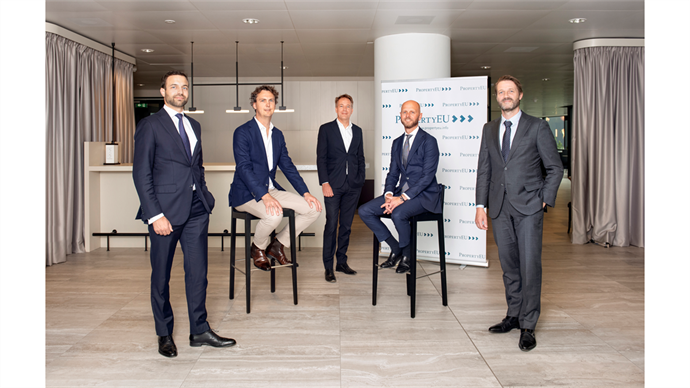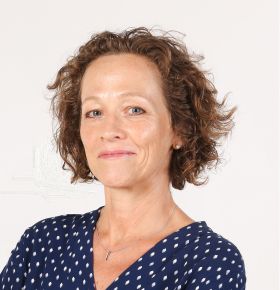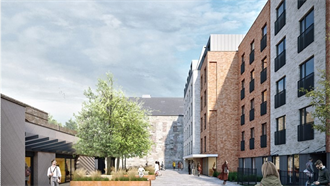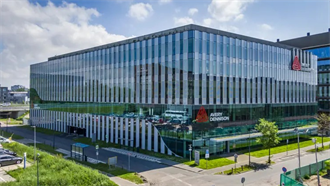International capital continues to chase scarce core product in the Netherlands amid a mixed picture for Dutch real estate, experts have said.
In a meeting at PropertyEU’s HQ in Utrecht, the five-strong panel at the Investment in the Netherlands private roundtable discussion also explained how occupiers are struggling with the fallout from Covid-19.
With the notable exception of logistics, pressure is mounting on occupiers in most sectors as the pandemic persists and economic recovery takes longer to kick in. Combined with lower government support for businesses which is due to be phased out by mid-2021, this will lead to corporate distress and insolvencies down the road, the experts believe.
Providing their views and analysis were Reinier Wegman, director and head of sales at real estate advisor Savills Netherlands; Arnout Scholten, partner and co-head of the global real estate & construction practice area group at international law firm CMS; Marcel Hertig, vice-president of real estate investments at alternative investment firm Angelo Gordon; Boudewijn Ruitenburg, chief operating officer of Dutch developer Edge; and Jeroen Gerritsen, managing director of Panattoni Netherlands.
The panel reviewed a wide range of topics, from demand and supply of real estate for sale and occupation to rental prospects; financing conditions; opportunities per asset class and investment style; legal terms and negotiations taking place; and factors at play within the ESG context.
At present, the Dutch market is in a state of limbo, according to Savills’ Wegman: ‘Product is coming to the market, but there are a lot of question marks about the occupational side of things, about rental growth, about financing – that’s where we are right now and nobody really has the answers,’ he said.
Recent data from Savills reveals over €7 bn was invested in the Dutch real estate market in H1 2020. While this failed to reach the record levels of the past three years, the volume was equal to that of 2016 and thus 11% higher than the 10-year average.
Hotels are suffering
On the occupational side, hotels in particular are suffering from the impact of Covid, with many seeking rent reductions from landlords to ride out the crisis. CMS’s Arnout Scholten said his firm is involved in ‘a lot of litigation regarding rent reductions, especially relating to hotels in the Amsterdam area’.
‘We’re seeing the first few insolvencies among hotels but also the first discussions with developers about whether you can redevelop a hotel into something else,’ said Scholten.
Hotel operators which have already been declared bankrupt include Tidal Operations, operator of the Holiday Inn in Amsterdam-Zuid and Crowne Plaza Schiphol in Hoofddorp near Amsterdam. Both hotels have been shuttered.
Office refurbs
Boudewijn Ruitenburg of innovative office developer Edge, which has been involved in several landmark developments and redevelopments in the Netherlands, believes occupier demands for healthier buildings post-Covid will lead to ‘big refurbishments in the office sector’.
‘We’re seeing major corporate clients starting to make plans about how to go back to work and how to restructure their office portfolios,’ he said. With greater numbers of employees expected to work from home in future, this will lead to ‘completely different office fitouts and technical installations’, he noted, and may result in reduced space requirements overall.
Angelo Gordon, which was active both as an office buyer and seller in H1, is targeting more Dutch business after raising $1.5 bn (€1.3 bn) of equity over the summer for its third European fund – the highest amount it has ever raised for a closed-ended Europe-dedicated real estate investment vehicle. The US firm, which partners with APF International on deals in the Netherlands, typically pursues a value add approach.
‘We buy existing buildings which have good bones but some kind of issue – that might be a lot of vacancy, tenants about to go insolvent or other complex situation - and we always want to add value,’ said VP Marcel Hertig. ‘Sometimes it’s a change of use – from office to residential or office to hotel or the other way round, so together with our local partners we try and unlock the potential.’
At present, Hertig noted, there is ‘very little value add product on the market and that is mostly driven by uncertainty’. There is also a clear lack of financing as banks become more cautious on what they lend. ‘There are debt funds in the market but they are 2-3 times more expensive than Dutch banks,’ he said.
Logistics growth
In the Dutch logistics sector, as elsewhere in Europe, developers of warehouse space like Panattoni are struggling to meet the huge demand for facilities triggered by the surge in e-commerce growth, the panel heard. Panattoni, which has two developments under way in the Netherlands and another four speculative projects in the pipeline, sees no end to the growth in demand. ‘More online means larger warehouses and more last mile,’ said the firm’s Dutch MD Jeroen Gerritsen.
An emerging area of growth, he noted, was online food retailing, with more and more supermarkets seeking last-mile facilities. ‘Every major grocery retailer in the Netherlands is busy reconfiguring its network to be able to accommodate that demand,’ he said.
The panel agreed that international capital continues to target core product in the Netherlands, which remains in short supply. Around 75% of the transacted volume in H1 involved core assets in the residential, logistics and prime office sectors, Wegman noted, ‘and the product we see coming to market is mainly core or core-plus’.
Such is the weight of capital chasing assets that yields are expected to compress further during the course of the year. At the same time, in the current trading climate, deal certainty is seen as more important than price, Wegman said. ‘Track record and local presence are the important things for buyers right now. Because deal certainty in today’s market is more crucial than the highest price.’
Meanwhile, government plans to raise real estate transfer taxes from next year – from 2% to 8% for residential property and from 6% to 8% for all other commercial property types – is expected to lead to a deal rush before year-end, predicts CMS’s Scholten. ‘It will affect the timing of deals. I think notaries will be very busy this year,’ he said.
The full report on the Investment in the Netherlands Roundtable appears in the October issue of PropertyEU Magazine


































